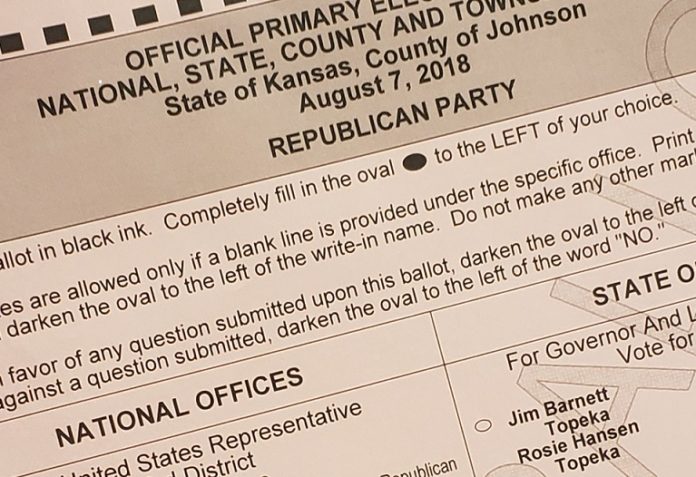Voting rights advocates on Tuesday went to court challenging new election laws passed by the Legislature, saying they violate the state constitution by interfering with voting and violating Kansans’ freedom to free speech and association.
The voting-rights group Loud Light joined with Kansas Appleseed, the League of Women Voters and the Topeka Independent Living Resource Center to challenge parts of two bills – HB 2183 and HB 2332 – passed by the Legislature this session.
Democratic Gov. Laura Kelly vetoed both bills but she was overriden by supermajorities in the Republican-dominated Legislature.
“The newly enacted laws show how intent the Kansas Legislature was to suppress Kansas voters and obstruct our constitutional rights,” said Jami Reever, executive director of Kansas Appleseed.
“All Kansans deserve to be trusted with our vote and to have our voices heard through accessible, strong, and legitimate elections,” Reever said in a statement.
The secretary of state’s office said Tuesday night it had not yet been served with the lawsuit and could not comment.
Senate President Ty Masterson said the lawsuit reflects the extreme nature of the groups that brought the lawsuit.
“It is not at all surprising that the lawsuit was filed by left wing groups who are opposed to securing our elections by making it easier to vote and harder to cheat,” Masterson said in a statement.
“The fact they are challenging modest limits on ballot harvesting and rules against impersonation of an election official demonstrates how radical these groups are.”
The lawsuit filed in Shawnee County District Court challenges these provisions of two separate bills passed during this year’s session:
- A cap on the number of ballots third parties can collect and deliver to election offices on behalf of someone else. They are now limited to 10 under the new law. Republicans said the process of collecting large numbers of ballots – called “ballot harvesting” – was ripe for abuse and the measure was intended safeguard elections. The lawsuit says the restriction severely burdens the right to vote by “significantly limiting the pool of individuals who can assist voters in delivering their completed ballots to election officials.” The lawsuit adds, “As fewer people are available to collect and deliver Kansans ballots, Kansas will face greater obstacles casting them and some may not be able to cast them at all, including plaintiffs’ members and constituents.” The lawsuit says the law hurts seniors, minority voters and voters with disabilities.
- A prohibition on county election officers from accepting an advance voting ballot sent by mail unless they verify that the signature on an advance voting ballot envelope matches the signature on file in the county voter registration records. The lawsuit contends that there is no standard for matching signatures, leaving it up to each county election official to decide how to verify the signatures.
- A ban on falsely representing election officials, which could include conduct that would lead someone to believe they were an election official. Critics said this provision could lead to Kansans being charged with a crime just by helping someone register to vote. The lawsuit said this provision would chill the free speech activities of various organizations to help Kansans know how to vote. The lawsuit says the bill’s broad language “gives arbitrary discretion” in determining what constitutes conduct that may appear to be an election official.
- A ban on any person not a resident of Kansas from mailing an application for an advance voting ballot. The lawsuit says the legislation failed to provide adequate notice to anyone who contracts with out-of-state companies for advance voting application mailings. This provision, the lawsuit said, includes no standards regarding enforcement, “opening the door for arbitrary and discretionary enforcement.”
“Together, the challenged provisions will make it more difficult for Kansans to vote,
targeting in particular the precise voting method — advance voting — that helped Kansas achieve its historic participation in 2020…,” the lawsuit states.
“These burdens will not fall equally on all Kansas voters,” the lawsuit said.
“Instead, they will make it far harder for specific communities, namely Kansas’s senior citizens, minorities, young voters, disabled individuals, and rural residents, to cast their ballots,” the lawsuit contends.
The lawsuit questions the need for the new voting laws, pointing to state and local officials who said they were pleased with how the 2020 election unfolded in Kansas.
The lawsuit emphasized the large voter turnout last year – 72% of Kansans cast ballots – and the lack of any evidence of voter impropriety.
“The only people who seemed unhappy with the broad participation of the electorate
in the 2020 election were the Republican majority in the Kansas State Legislature,” the 53-page lawsuit contends.
“Despite widespread and well-founded objections from voters, local churches, voter education organizations, and civil rights groups, the Legislature quickly moved forward with sweeping legislation…that is intended to and will have the effect of making it harder for lawful Kansas voters to participate in the state’s elections.”












